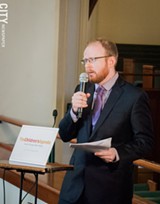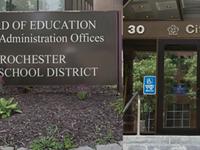[
{
"name": "500x250 Ad",
"insertPoint": "5",
"component": "15667920",
"parentWrapperClass": "",
"requiredCountToDisplay": "1"
}
]
The Rochester school district's budget has been a target of the district's critics for years. The district, they say, has plenty of money, but its officials don't know how to manage it.
But Interim Superintendent Daniel Lowengard's proposed $925 million budget for next year, which he presented to school board members last week, highlights an often-overlooked reality: the difficulty of managing a high-needs district that has a declining enrollment.
Certainly some critics won't be impressed by a sudden turn toward austerity. Improving the district's academic performance may be harder than many people think, though.
Lowengard said that sharp cuts throughout the district were needed to close a $40 million budget gap and balance the budget. His proposal will eliminate 326 full-time jobs – 194 of them teachers. And he told board members that the district needs to stick to an austerity plan for the foreseeable future. Expenses can't continue to exceed revenue, he said, or the district may soon reach a point where it can't pay its $85 million debt.
Calls for fewer cuts can already be heard from both inside and outside the school district. But Lowengard says the district has been spending more revenue than it receives since about 2013. Its debt then was roughly $40 million, but it still had a decent reserve fund. The debt has now reached $85 million, and reserve funds are nearly depleted, Lowengard said.
During that same period, the district's enrollment shrank from 31,000 students to 25,000. School officials say the majority of those students have enrolled in charter schools, and as more charter schools open, that trend could continue. The district lost much of the per-pupil state funding that it received for those students, but it still bears costs related to their transportation and many of their special-education services.
Changes in district leadership may have exacerbated the problem. Declining enrollment has left the district with excess space in some buildings, while the cost of maintaining those buildings has continued to increase. Rather than consolidate and close schools, however, former Superintendents Bolgen Vargas and Barbara Deane-Williams left most schools open, trying to respond to competing demands for more school choice and a return to neighborhood schools. In the process, the district has spent more than $60 million annually on transportation costs.
"There's a fundamental difference between former Superintendent Barbara Deane-Williams and Daniel Lowengard's approach to the budget," says board member Willa Powell. "She was prepared politically to spend on the needs of students and schools even if it created a crisis."
Powell and other board members fully supported Deane-Williams' decision to spend more and to seek increased funding from state legislators. Deane-Williams wanted to provide city students with the same educational experience as suburban students receive, Powell says: strong social-emotional support and the enrichment of arts, music, and sports.
While faced with a huge budget gap for the 2017-2018 school year, Deane-Williams spent $20 million to hire more teachers and social workers.
Lowengard's approach is to do "some necessary right-sizing," Powell says. Many people believe an austerity plan is the right strategy, but the district has to fund enough social workers and school psychologists, for instance, to meet the minimum state requirements.
"And we all know our students need and deserve more," Powell says.
The swing toward austerity is bound to cause some pain. Lowengard proposes cutting 50 administrators and nearly 60 jobs in support staff such as paraprofessionals and teaching assistants, in addition to the 194 teaching positions. Though he says he hopes the cuts can be made mostly by attrition, he hasn't ruled out the possibility of layoffs.
And there could be cuts to positions that some board members and outside stakeholders strongly support, such as counselors and social workers. Even before the budget was presented, Eamonn Scanlon, education policy analyst with the Children's Agenda, sent out a press release expressing concerns over possible cuts that could undermine the district's progress in reducing suspensions and improving school climate.
The Children's Agenda is a member of ROC the Future, the coalition of community and business leaders and non-profit agencies that has asked State Education Commissioner MaryEllen Elia to change the district's system of governance.
Another huge concern, says Scanlon, are proposed cuts to the administrators in special education, which is currently under the oversight of the Empire Justice Center. CASEs – the Coordinating Administrators for Special Education – help parents navigate the complex process of getting the correct physical, emotional, or intellectual support. Lowengard proposes cutting some of the CASEs, and that's alarming, says Scanlon. CASEs were cut by Deane-Williams and then reinstated after much criticism.
CASEs are key to helping disabled students receive the support school districts are legally obligated to provide, says Scanlon. "These are pretty significant cuts if they all go through, and the CASEs are the most problematic," Scanlon says. "It's not clear whether there is an effective strategy."
Most troubling to Scanlon, however, is how the administration will manage the complexities of a school system that is steadily losing students. The district could be left with a student population that is disproportionately children with high needs.
Reducing staff as enrollment declines is reasonable, Scanlon says, but the wild swings of ramping up and cutting have to end.
"This puts a lot of stress on a school district," he says. "It's very disruptive. There's going to have to be a multi-year plan."
Criticism is also coming from the teachers union. Rochester Teachers Association President Adam Urbanski says he understands that the district has a serious deficit that needs to be resolved.
"But layoffs of 194 teachers would be devastating for students," Urbanski says. He presented a plan to Lowengard in February that would encourage early retirement of senior teachers and could save the district about $8 million annually, he says. These teachers are among the highest paid due to their tenure and experience, and it could replace some of them with less experienced teachers earning lower salaries.
In Urbanski's plan, the teachers taking early retirement would receive $50,000 in payments of $10,000 over five years.
For the plan to be effective, at least 200 teachers would have to take early retirement, but the district wouldn't save any money if it immediately replaced them all.
The plan avoids a big layoff, and reduction in employee costs could be applied to the debt, Urbanski says. Another benefit is that the plan would leave newer teachers, who are more likely to be recently hired teachers of color, in place, says Urbanski. And it could create the opportunity in the future for more teachers of color to replace future retirees, he says.
Urbanski says the administration already knows that 56 teachers are retiring. A conflict may develop about them, however.
The board will vote on Urbanski's plan at its March 28 meeting. Board member Willa Powell says the plan is interesting and would work as long as the district isn't paying teachers who were already planning to retire a bonus.
"If we have people who were already retiring, why would we reward them?" Powell says. But Urbanski says the deal was initiated by the union to help the district through a difficult time and was negotiated in good faith.
"It meets their goals, it does something to reduce the structural deficit, and it helps to diversify teaching staff, which is a goal we share," Urbanski says.
Adding to the district's budget challenges: Mayor Lovely Warren's insistence that city officials have a say in how the district spends some of its money. Under a state law known as Maintenance of Effort, the city provides $119 million of the school district's funding each year, and on March 8, Warren notified the district that she wants $15.7 million of that money spent on "community schools" – schools with longer days and with extra services such as health care and adult education.
Lowengard's proposed budget, in fact, calls for cuts in community schools funding.
In his response to Warren, Lowengard noted that the district is facing a large budget deficit. The district could commit more money to community schools, he said, if the city increased its funding.
That's not likely. And Warren Chief of Staff Alex Yudelson said late last week that the administration will continue to insist on a say in how the district spends the city money.
City Council votes on the school district's budget in June each year, but historically, Council members have simply voted to approve or disapprove the full budget rather than singling out specific expenses or income sources. And the mayor has had no voice in the budget at all. But Yudelson said the Warren administration is convinced that state law and the City Charter give the mayor and City Council the authority to tell the school district how to spend ""not the entire budget but the portion the city provides."
The Warren administration hasn't determined what action it would take if the final version of the school budget doesn't reflect the community school expansion that Warren wants. Once the administration sees what's in the budget, Yudelson said, "we'll have to see what our options are."
The school board could decide to increase funding for community schools. It will start holding public hearings on the budget on April 2, will vote on the final budget proposal May 7, and will send it to City Council for its June vote.
Other than Lowengard's initial response, school district officials haven't said much about Warren's interest in the Maintenance of Effort money. They seem confident, though, that the law is clear: that only the district can determine how it spends its revenue.
School board president Van White says the board shares Warren's interest in community schools. "Everybody is supportive of community schools," he said last week. "Our community schools – and we already have a number of them – are some of the ones that are our most successful. But we can't just say that we want to do them without knowing how we're going to pay for them and sustain them. Let's work together to find a way to find that money."
Speaking of...
Latest in News
More by Tim Louis Macaluso
-

RCSD financial crisis builds
Sep 23, 2019 -

RCSD facing spending concerns
Sep 20, 2019 -

Education forum tomorrow night for downtown residents
Sep 17, 2019 - More »









